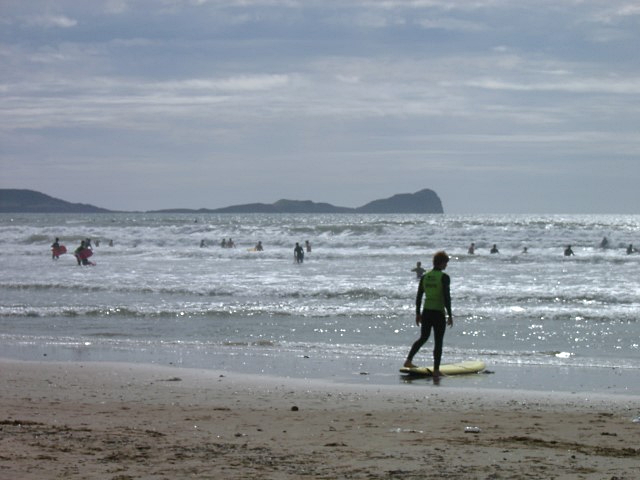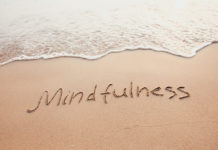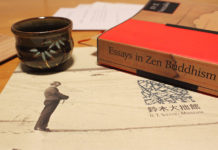‘Chairman Mao’ greeted me gently from the back of a small Chinese ‘bread van’, a simple but practical vehicle found all over China in June 2001. The local police, no doubt glad to be rid of me, had escorted me to him, though I find I have no memory of my journey with them or of covering the walls of their police cell with the blood seeping from the wounds on my arm. I presume some events are just too traumatising for a human being to retain in memory and that day had not been a good one.
I don’t want to say much about what happened in China that year. Some will say I was psychotic, but in truth such pathological words serve poorly to relate what had happened to me over the previous ten days — days which were rich beyond words in experiences both beautiful and terrible. If humans live lives of emotions, this was a period of grand opera gone ‘mad’, yet I look back now and have no regrets about this time. The pain has gone now, and I am grateful for who it has made me — a happier person than before. Perhaps broken open a bit, but in a good way.

I was living in China at the time to learn Tai Chi. Thankfully the teacher, who I had formed a long-term relationship with, lived in a beautiful small town called Yangshuo, surrounded by amazing limestone karst hills and in the summer as it was then, lush green rice paddy fields.
My earlier life in England had been out of balance somehow. Too much focus on my ‘beautiful’ mind perhaps. I had studied at Cambridge University, getting a place without difficulty, and subsequently worked for three years as a financial auditor and then a computer programmer. It was all a pretence really, my inner world was under dire stress, and it was taking more and more of my energy to keep up appearances and play the role the world was asking of me.
I don’t believe there had been any alternative possible for me at that time. My family life growing up was a good period for me, and I have no complaints, yet there seemed to be something in the way my nervous system was wired, a leftover of birth trauma perhaps, that meant that relaxation and physical comfort weren’t part of my being. Obviously, you adapt as a child, cutting off areas of oneself that are incompatible with survival and the needs of significant others around you. It isn’t easy to explain now as I seemed happy with my friends and had close relationships with my parents, brother and grandparents, yet some part of me was experiencing life by feeling through my mind and its imagination rather than through the lived experience of my body. I read science fiction and fantasy books continuously.
The outcome of all of this had been a wise decision: to walk away from it all, and take space to rest deeply and work out who I was and what I wanted in life. My mind was burnt out and the old escapes were no longer available to me. Pain was a part of my existence at this time — eased only by resting in deep meditation or doing my Tai Chi which became an obsession.
I might have thought that life would get easier from doing such healing activities, but in fact the journey towards real health was only just beginning and the ride wasn’t going to be a smooth one.
So, I found myself speaking with a kindly Chinese psychiatrist, who as I say manifested in some way for me as Chairman Mao, my arch ‘enemy’, from an archetypal theme that had been riding me, of needing to struggle to save the soul of China. I assumed naturally that he planned to have me killed, but I felt no inclination to resist that moment.
What followed, I leave to your imagination. The struggles to avoid being taken into the hospital, thinking I was being quietly executed. The ‘torture’ scenes tied to a wooden bed hand and foot while my arm wound was stitched without anaesthetic. It was so difficult for all involved. In fact, they were all nice people and only a day or so later we were getting along just fine. My parents’ arrival from the UK helped the process enormously. My favourite memory is the canteen lady bringing me meals in a metal bucket and calling my Chinese name, “Andounee, Andounee.” I had screamed it out at full volume during the ‘torture’ scene, so no one could forget it.
With some grace, my parents got permission to take me from the hospital and after a week as an outpatient, we were allowed to fly back to the UK. All seemed well, except I found my mind changed by the experience. I was having dark thoughts about harming myself and those around me. I didn’t recognise this, though there had been a few hints with a girlfriend before. It was worrying enough for us to decide to contact our local psychiatrist who arrived hours later.
There is not much I regret in life, but I do pain over this decision. When a choice causes so much suffering for oneself, it is not easy to come to terms with, though I have. For a while I was just in a rage at my psychiatrist, but over time a peace came, and forgiveness. Still, I feel called to do something about this aspect of society, the way we treat people when they are most vulnerable and confused. It now seems absurdly inhumane: the coercion, medicalisation and pills, the refusal to acknowledge trauma, the stigma and branding for life. My least favourite quality of the psychiatrist who worked with me was his willingness to deceive me for the ‘greater good’ of me taking his medication. As he said himself, if he had told me at the outset that his medications were for life, I would have declined his care, whereas his offer of ‘three months and then done’ was a trade-off I had been willing to make in exchange for the emotional care I hoped I would receive for all the rage and pain going on inside me.
As it happened, the only emotional care came mainly from chats with my doctor. All other services seemed to fall away whenever I approached, and we gave up eventually. Antipsychotic medication, Risperidone in my case, seemed to be ‘the Way, the Light and the Truth’ of this healing path. Sadly, everything my doctor said about gold-plating my neuron connectors and correcting the chemical imbalances in my brain proved to be misleading nonsense, which even he stopped repeating after a while, wondering, I’m sure, what the drugs were doing to me.
It’s an interesting experiment. Spend years educating a child till they nearly get a first in some subjects at Cambridge, and then when they later come to you in need of emotional care with trauma off the scale, label the person acute psychotic and mentally ill for life and prescribe pills that turn the person into a subhuman vegetable. There was an interesting scene in a strange film, The Lawnmower Man, in which someone’s brain is ‘mowed’ leaving them like an imbecile. It’s a good metaphor. Chemical lobotomy.
My complaints that this mental state was being caused by the medication, not my experiences, were ignored at the time, whereas later when I came off, my capacity to follow a film for more than half an hour or to read a book returned within a week!
You can imagine the rest, I think: the depression, despair, suicide urges, and then when in the process of coming off the medication, the near suicide attempt as waves and waves of pain went through me — raw unprocessed emotional pain bursting through as the suppressant effects of the medication wore off. Nice. It’s a good idea to come off slowly and have lots of emotional care if there is trauma to deal with.
Now this is a story of surviving psychiatric care and of life beyond it. I can only say I am grateful to life that this was possible for me. That moment when my psychiatrist, realising things weren’t going well, suggested an antidepressant alongside the antipsychotic and possibly switching Risperidone for something else, and my response, somehow released from myself at a time when I was totally broken and disempowered as a human being, was: “No, that’s crazy!” I think my psychiatrist quietly agreed with me but couldn’t admit this to himself. He shut up anyhow and we took over my care from then on with a little support from my doctor.
I survived a fast coming off, over two months, a railway power line only a foot from my hands at one desperate moment, and a household enlivened by my need to release rage — thankfully it was mindfully guided to the downstairs toilet rather than directed at family members, although they did get it once or twice. Almost four months later, my natural emotions started to return, a grace period beyond any heaven described in religious fantasy.

There is much to say on the process of recovery from then on. It was as if I was sniffing out my real medicines, and they came in all forms, from Bach flower remedies for timidity, to homeopathy, Tibetan medicine, writing computer games to heal my mental concentration, and playing beautiful music that brought back my emotional feeling and joy. Assisting with teaching an English class, chatting with Chinese women who welcomed me into their local community gatherings. Going through 12 stages of Rolfing, training as an English teacher, learning Shiatsu, rediscovering lost parts of myself, and learning with the top Tai Chi teacher in the world. Walking the miles-long beautiful Rhossili beach, paddling in the water, grateful to still be alive experiencing all of this.
One might think that this was it and all was well from then on and I could end here, but it was just another beginning. My healing journey was to go on for another eight years, with me going in and out of non-ordinary states in a big way every couple of years and in a smaller way in between. There did seem to be a rhythm to it, though I wasn’t able to avoid things kicking off.
One might think with such things happening I would engage a psychiatrist once more, but no, that never occurred to me even once. I had decided my job was to survive this thing whatever it took, and I was willing to face anything rather than be drugged again like before. Obviously, I studied everything I could find on non-ordinary states, or Bardo in Tibetan culture, from Carl Jung to Chogram Trungpa, and it helped. It would be a lie to say it was ever easy, travelling across the world at times not knowing whether I was alive or dead, praying I would arrive in the same dimension as my family and that life would begin again. My secret life, which I couldn’t share with most people around me.
When I reflect now, the journey through the four big episodes does not feel random or like an illness pattern. Each had significant numinous aspects, which reflect a Jungian individualisation journey. Integrating first my wolf, then a demonic anima aspect and finally the dark side of God, the devil as I saw it.
With the help of inner journeys through Holotropic Breathwork®, Zen, Tai Chi, bodywork and healing and deep training in Sei Ki, a form of Japanese Hara Training and Shiatsu, something inside finally settled down, and life feels good.
One can never know. Life throws my nervous system around still at times, the behind-glass feeling of dissociation happening occasionally, but I think it’s alright.
I enjoy my days and focus now on helping others.
Thank you!















Another beautifully written account of the nightmarish horrors brought on by the evil “psychiatric drug lords”. I am so glad, Anthony, that you persisted and left it behind. Let us find the alternative, a truly benevolent approach toward those having existential/spiritual emergencies. No drugs please!! I believe that the “secret life” is not something that can be shared in the mundane world. One has to process it and realize that just because the “normal” world cannot understand, doesn’t negate it.
All the best on your continuing journey!
Report comment
Thank you Louisa. Sorry for the slow reply. I’ve spent the past month in a Zen Centre. Yes, for me a difficult issue in ‘mental health / spiritual emergency’ is exactly that you can’t speak about the ‘secret life’ with most people. And if you engage with clinicians, it becomes pathologized. Yet, there is a deep need for connection and community and for affirmation. Its so difficult to be alone going through these kind of experiences. Hopefully this narrative will prove helpful to people and safe groups and environments will evolve where people can be met in their times of need in nourishing ways.
Report comment
Thank you for sharing. My own lived experience was much less traumatic but 40 years of recovery has been a very rewarding experience. One lesson sticks in my mind, as it is a recent one. If the evidence contradicts the belief system, verify the evidence and be willing to change the belief system.
May your journey continue to bring you enlightenment.
Eric.
Report comment
Hi Eric, if the experiences of people, usually written off as psychotic hallucination or delusional, are given more attention and perhaps valued by the society more, then many of the beliefs we hold about the nature of reality may have to be updated. This may be challenging for many people, especially clinicians, but will facilitate cultural evolution.
Report comment
How one who has gone through a spiritual emergency can relate to your lived experience! Many can relate to this beautiful mirror you have created. Thank you for the determination, vulnerability and courage to stand up for your “self” and make it through the waves. No doubt you have helped and will continue to help many others on this illuminating path. Much respect. A beautiful piece. Can’t wait to read the others.
Report comment
Thank you Melinda. The ‘recovery process’ and ‘spiritual journey’ really started for me when I was able to reframe my experiences as my ‘spiritual growth journey’, valuing them as well as myself, without denying the emotional mess, immaturity and trauma that needed facing. The collective understanding of these kind of experiences which we hold in society is really important in helping individuals on their way and hopefully this narrative can help it evolve a little.
Report comment